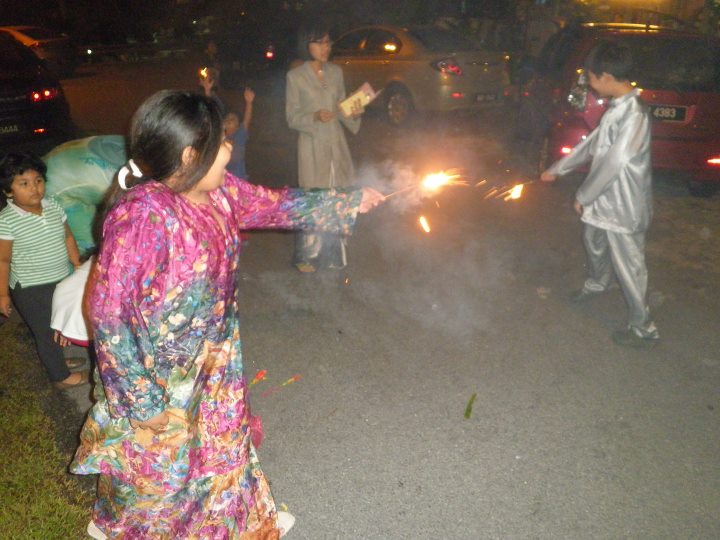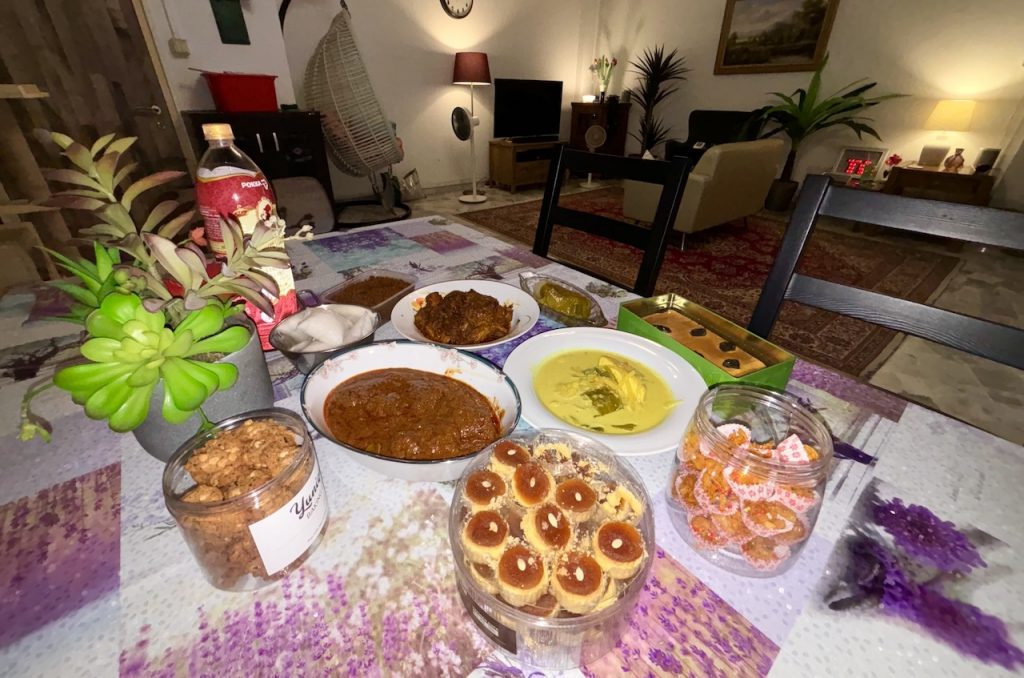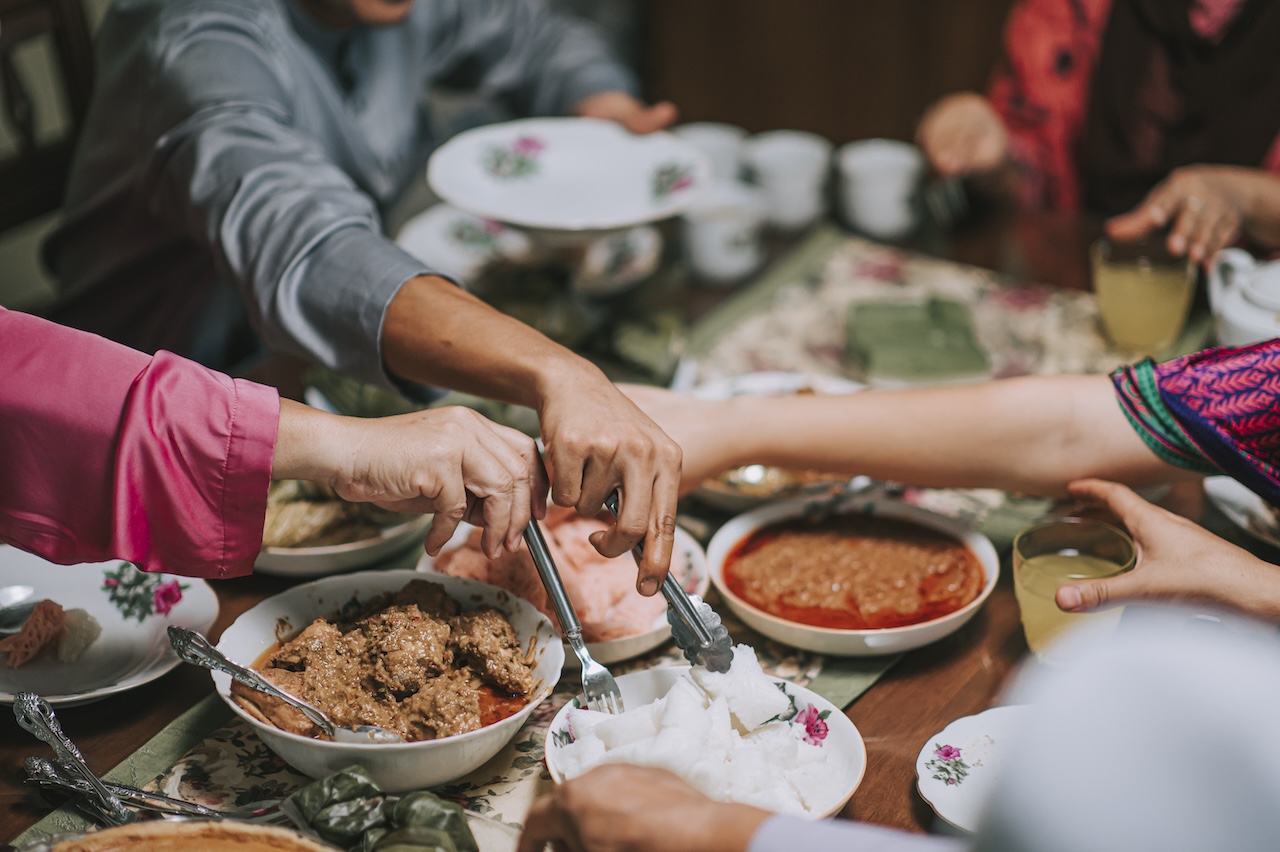Top image: Edwin Tan / iStock
Some of my fondest recollections of Hari Raya Aidilftiri transport me back to childhood, when my family and I would travel to Malaysia to reunite with my mother’s relatives. The core memories, of course, revolve around food.
Amidst the bustling preparations there, I would witness my opah (grandmother) stirring colossal vessels of beef rendang and sayur lodeh, her wiry arms glistening amidst the steam. My aunts would be seated around the table, weaving coconut leaves into intricate pouches for ketupat. The men in the family would be making teh pandan and sipping on them as they adorn fairy lights around the house.
ADVERTISEMENT
My cousins and I? After stealing a couple of bites of opah’s rendang, we’d be off running around the kampung with sparklers in our hands, soaking in the joyous atmosphere of Eid with the ones we love.

Time passed, and we young folks entered adulthood. Visits to Malaysia became less frequent. The cousins have since started families of their own. But one whiff of my opah’s rendang (faithfully recreated by my mother every Eid) is enough to bring those memories flooding back.
After Ramadan’s month of restraint—when we abstain from food, water and various worldly indulgences from dusk to dawn—Eid comes as a long-awaited reward for our devotion. Our Singaporean love affair with food resumes.
Sumptuous meals form the cornerstone of this joyous occasion, and it’s impossible not to see videos and pictures of friends gorging on lontong, ketupat, rendang, satay, ayam masak merah, sambal sotong and serunding on our social feeds.
But sandwiched between Raya outfits and family shots this year are posts from Gaza. Men running towards the sea, scrambling for aid packages. Mothers cooking grass for their families. Children playing with hand-made lanterns among run-down tents.
How can I indulge in the pleasures of Eid when my fellow Muslims suffer, their cries for aid drowned out by the clamour of our festivities?
Of Food and Famine
In the case of Gaza, food supply forms the basis of global concern today. I make mental comparisons looking at the spread of raya dishes on my dining table with the thought of people flocking over a pot of soup. I cannot shake off the awareness of those who lack even the most basic of necessities while I indulge in my yearly traditions.
ADVERTISEMENT
This overwhelming sense of awareness of the ongoing atrocities happening in Gaza was met with feelings of shame and guilt as I carried out my Raya preparations at the Ramadan Bazaar. Here I was, carrying bags of new outfits and snacking on deng deng, while fellow Muslims 7,975 KM away are so desperate that they resort to making ‘bread’ out of rabbit and donkey feed.
It’s easy to spiral into disassociation, grappling with the reality of my privilege while millions in Gaza teeter on the edge of starvation. The stark contrast between my comfort and their suffering begs the question: Why do I get to live like this while others suffer? Is it inappropriate that we greet the month of Syawal with vibrant OOTDs and sumptuous feasts while Palestinians greet theirs with bombs and bullets?

Psychologists term it ‘compassion fatigue’ and ‘empathic distress’, both of which have been amplified during the relentless siege on Gaza over the past six months. Even if one isn’t directly impacted, it’s normal to experience a sense of helplessness and guilt, feeling inadequate in our response.
It serves as a stark reminder that prioritising humanity over indifference could swiftly remedy this crisis. Food marks the joy of Eid, but there can be little joy for Gazans. When even World Central Kitchen aid workers are systematically targeted and killed, it’s tough to find any semblance of hope.
And yet, Palestinians persevere. Accounts like @hamadashoo and @myhanitizer provide a window into the daily struggles and fleeting joys of Palestinians in Gaza—often centred around the basic tenet of food.
ADVERTISEMENT
Even as they share glimpses of their meagre meals for iftar and for Eid, their resilience and dignity shine through, serving as a testament to the human spirit’s capacity to find solace amidst adversity.
Intention & Hope
With this enlightened perspective, dwelling on complaints about my first-world inconveniences like hunger and thirst during Ramadan feels trivial by comparison. Instead, this year’s Ramadan has amplified the essence of compassion, introspection, and communal unity that the month embodies.
Through positive action and solidarity since the start of the siege on Gaza, it became clear that Singaporeans, be they Muslims or not, share the same sentiments that what is going on is absolutely devastating—and that more can be done.
Witnessing grassroots organisations like Love Aid SG delivering direct food and aid to Gaza’s people is nothing short of amazing. Seeing people from all walks of life trying to spread awareness of the situation there is remarkable. While my contributions may seem insignificant in the broader picture, they are my anchor, affirming that even small gestures can make a significant impact for good.
As I delve into my feelings of guilt and detachment, I’m struck by the profound lessons of Islam during Ramadan. By willingly relinquishing our comforts for a mere 30 days, we’re compelled to confront our privilege, to honour the less fortunate, and to hold compassion in all our endeavours.
I’m also reminded of the sacred objectives of observing Eid: gratitude, forgiveness and connection. Along with commemorating the joy of Eid, it’s important to set our intentions to celebrate the Palestinians who, despite their many struggles, still inspire a world with their neverending strength in the face of inhumane atrocities.
As I savour the flavours that evoke cherished memories of my childhood, I offer prayers for the children of Gaza, yearning for the day when they, too, can revel in the pleasures of a fulfilling meal and the safe embrace of loved ones.





